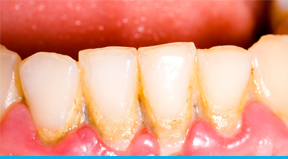Periodontal Disease
There are over 100 million bacteria in just one drop of saliva that are constantly exposed to our teeth causing several complications in the mouth. Periodontal disease, also known as gum disease, is caused when bacteria builds up plaque between the gums and teeth. Plaque, tartar, malocclusion are major reasons for gum disease.
Gum disease affects your overall body health. It is a primary cause of tooth loss, and is often linked to diabetes. Moderate to severe gum disease has been strongly linked to strokes, adverse pregnancy outcomes and especially diabetes.
Gum disease is an infection in your gums and jaw bone. Your gums may be swollen, red, bleed and receded down your teeth. Usually, gum disease is a silent progressive problem which most people are unaware of until a dental professional alerts them. Gum disease may eventually result in an unstable base for your teeth, which then become mobile and may fall out or have to be removed.
If detected early, it can be treated and managed better. It is important to have regular dental check-ups so that any problems with your teeth and gums can be detected and treated early
Risk Factors
- Smoking: Need another reason to quit smoking? Smoking is one of the most significant risk factors associated with the development of gum disease. Additionally, smoking can lower the chances for successful treatment.
- Hormonal changes in girls/women: These changes can make gums more sensitive and make it easier for gingivitis to develop.
- Diabetes: People with diabetes are at higher risk for developing infections, including gum disease.
- Other illnesses and their treatments: Diseases such as AIDS and its treatments can also negatively affect the health of gums, as can treatments for cancer.
- Medications: There are hundreds of prescription and over the counter medications that can reduce the flow of saliva, which has a protective effect on the mouth. Without enough saliva, the mouth is vulnerable to infections such as gum disease. And some medicines can cause abnormal overgrowth of the gum tissue; this can make it difficult to keep teeth and gums clean.
- Genetic susceptibility: Some people are more prone to severe gum disease than others.



